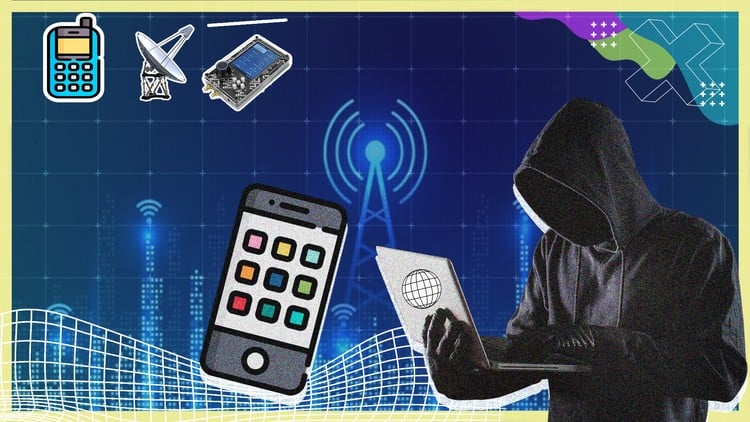
Master the mobile networks from GSM to 5G, SS7, GPRS,SS7 Vulnerability, GNU Radio, HackRF and Get Your skills for 2025!
⏱️ Length: 5.5 total hours
⭐ 4.43/5 rating
👥 14,279 students
🔄 October 2025 update
Add-On Information:
Note➛ Make sure your 𝐔𝐝𝐞𝐦𝐲 cart has only this course you're going to enroll it now, Remove all other courses from the 𝐔𝐝𝐞𝐦𝐲 cart before Enrolling!
-
Course Overview
- This intensive course explores mobile network security from foundational 2G systems to revolutionary 5G advancements.
- Delve beyond theoretical concepts to uncover practical vulnerabilities and defense mechanisms across diverse cellular generations.
- Uncover how past architectural decisions impact present-day security landscapes and future innovations.
- Gain unique insights into real-world ‘hacks’ and potential attack vectors in GSM, GPRS, SS7, LTE, and 5G environments, fostering a proactive security mindset.
- Bridge the gap between traditional networking principles and software-defined radio (SDR) applications, enabling hands-on analysis and manipulation of wireless signals.
- Prepare for the evolving demands of 2025 and beyond by mastering both legacy infrastructure weaknesses and the robust security paradigms of next-generation networks.
- This course is designed for security enthusiasts, penetration testers, network engineers, and anyone aspiring to specialize in telecommunications security.
- Explore the often-overlooked vulnerabilities within the SS7 signaling system, understanding its profound implications for global network integrity and subscriber privacy.
- Leverage powerful open-source tools like GNU Radio and specialized hardware such as HackRF One to build, analyze, and experiment with mobile communication protocols firsthand.
- Develop a holistic understanding of mobile network operations, from subscriber authentication to advanced security features.
- Emphasizes practical application for ethical hacking, security research, and defensive strategies in the mobile network domain.
- Understand the critical balance between network accessibility, performance, and robust security implementation across different mobile generations.
-
Requirements / Prerequisites
- Basic understanding of networking fundamentals: Familiarity with TCP/IP, network layers, and common network protocols will be highly beneficial.
- Comfort with Linux command line: Many SDR and security tools are primarily Linux-based, requiring proficiency in terminal commands.
- Fundamental programming/scripting knowledge: While not strictly a coding course, familiarity with Python or similar scripting languages can aid in customizing SDR flows and automating tasks.
- Dedicated SDR hardware (e.g., HackRF One): Essential for the hands-on ‘hacks’ and signal analysis components of the course.
- A powerful computer: Capable of running virtual machines and processing real-time SDR data without significant performance bottlenecks.
- Software installation: Willingness to set up and configure various open-source tools like GNU Radio, Wireshark, and potentially custom drivers.
- A curious and analytical mindset: Essential for dissecting complex wireless protocols and troubleshooting technical challenges.
-
Skills Covered / Tools Used
- Mobile Network Penetration Testing: Methodologies for identifying and exploiting vulnerabilities in GSM, GPRS, LTE, and 5G.
- Software-Defined Radio (SDR) Proficiency: Master the use of GNU Radio for designing, simulating, and implementing custom wireless communication systems.
- Signal Interception & Analysis: Capturing, decoding, and analyzing over-the-air mobile network signals with SDR devices like HackRF One.
- Protocol Reverse Engineering: Develop techniques to understand and manipulate complex protocols like SS7, gaining insights into their operational intricacies.
- Vulnerability Assessment: Conduct security audits on mobile network components, identifying weaknesses from authentication flaws to data leakage points.
- Traffic Analysis: Utilize tools like Wireshark in conjunction with SDR to dissect and interpret mobile network traffic at various layers.
- Ethical Hacking Methodologies: Apply structured approaches to simulate real-world attacks, understanding both offensive and defensive strategies.
- Exploiting SS7 Vulnerabilities: Practical application of known SS7 flaws to demonstrate potential attacks such as location tracking or call interception.
- Network Security Auditing: Learn to evaluate the security posture of mobile network elements and propose mitigation strategies.
- Hands-on with HackRF: Gain practical experience configuring and operating the HackRF One for various signal processing and wireless experimentation tasks.
- GNU Radio Companion (GRC): Develop flowgraphs for signal generation, reception, and processing.
-
Benefits / Outcomes
- Become a Mobile Network Security Specialist: Position yourself as an expert in securing and analyzing cellular infrastructures.
- Hands-On Vulnerability Exploitation & Mitigation: Acquire practical skills in identifying, demonstrating, and defending against mobile network attacks.
- Career Advancement in Cybersecurity: Open doors to specialized roles in telecommunications security, red teaming, penetration testing, and security research.
- Deep Understanding of Future Technologies: Be at the forefront of 5G security, understanding its unique challenges and opportunities.
- Practical SDR Expertise: Gain invaluable experience using professional-grade SDR tools to interact directly with wireless spectrum.
- Enhanced Problem-Solving Skills: Develop a critical, analytical approach to complex network challenges and security puzzles.
- Independent Research & Development: Equip yourself for independent research into emerging wireless technologies and security.
- Future-Proof Your Skills: Stay relevant in a rapidly evolving technological landscape by mastering legacy and cutting-edge innovations.
- Contribute to Network Resilience: Understand how to build and maintain more secure and robust mobile communication systems.
-
PROS
- Highly Practical & Hands-On: Emphasizes real-world application with SDR tools, not just theoretical concepts.
- Comprehensive Coverage: Spans multiple generations (GSM to 5G), providing a holistic view of mobile network evolution and security.
- Focus on ‘Hacks’ & Vulnerabilities: Directly addresses the offensive and defensive aspects of telecommunications security, making it highly relevant for security professionals.
- Future-Oriented: Incorporates 5G security, ensuring skills are relevant for upcoming industry demands.
- Industry-Relevant Tools: Teaches proficiency with powerful open-source tools like GNU Radio and specific hardware like HackRF.
-
CONS
- Steep Learning Curve: The breadth of topics and the practical, technical nature might be challenging for absolute beginners without prior technical exposure.
Learning Tracks: English,IT & Software,Network & Security
Found It Free? Share It Fast!